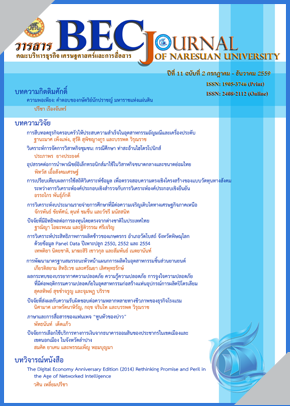อุปสรรคต่อการนำพาณิชย์อิเล็กทรอนิกส์มาใช้ในวิสาหกิจขนาดกลางและขนาดย่อมของไทย
Main Article Content
บทคัดย่อ
งานวิจัยนี้ได้ทำการศึกษาวิสาหกิจขนาดกลางและขนาดย่อมของไทยต่ออุปสรรคในการนำพาณิชย์อิเล็กทรอนิกส์มาใช้ในกิจการ โดยมีวัตถุประสงค์เพื่อศึกษาระดับของอุปสรรคและปัจจัยลักษณะของกิจการที่มีผลต่อ การนำอีคอมเมิร์ซมาใช้ในกิจการของไทย รวมถึงกำหนดแนวทางในการลดอุปสรรคต่อการใช้อีคอมเมิร์ซ ทั้งนี้ผู้วิจัยได้เก็บข้อมูลผู้ตอบแบบสอบถามจากวิสาหกิจขนาดกลางและขนาดย่อมของไทยที่นำมาวิเคราะห์ข้อมูลได้จำนวน 70 ราย โดยสถิติที่ใช้ในการวิเคราะห์ข้อมูลคือสถิติเชิงพรรณนาและสถิติเชิงอนุมานเพื่อทดสอบสมมติฐานด้วย t-test ผลการศึกษาแสดงให้เห็นว่าอุปสรรคด้านเทคนิคมีค่าเฉลี่ยสูงสุดต่อการนำอีคอมเมิร์ซมาใช้ในกิจการของไทย รองลงมาคือด้านเศรษฐกิจ กฎหมายและข้อบังคับ สำหรับผลการทดสอบสมมติฐานพบว่ากิจการที่ไม่ใช้อีคอมเมิร์ซมีค่าเฉลี่ยอุปสรรคด้านองค์การ กฎหมายและข้อบังคับสูงกว่ากิจการที่ใช้อีคอมเมิร์ซอย่างมีนัยสำคัญที่ระดับ 0.05 ขณะที่กิจการที่ทำธุรกิจส่งออกกับไม่ได้ทำธุรกิจส่งออกมีค่าเฉลี่ยอุปสรรคด้านองค์การที่แตกต่างกันอย่างมีนัยสำคัญที่ระดับ 0.05 นอกจากนี้กิจการที่อยู่ต่างจังหวัดมีค่าเฉลี่ยอุปสรรคที่แตกต่างกับกิจการที่อยู่กรุงเทพและปริมณฑลในด้านเทคนิค องค์การ และกฎหมายและข้อบังคับ อย่างมีนัยสำคัญที่ระดับ 0.05 สำหรับแนวทางในการลดอุปสรรคต่อการใช้อีคอมเมิร์ซในกิจการของไทย หน่วยงานที่เกี่ยวข้องควรจัดหาบุคลากรที่มีความรู้และความสามารถในการส่งเสริมให้ความรู้พื้นฐาน ด้านอีคอมเมิร์ซ ให้คำปรึกษาด้านความปลอดภัยในการใช้อินเตอร์เน็ตและการชำระเงินของอีคอมเมิร์ซ รวมถึงจัดทำมาตรฐานและส่งเสริมความเข้าใจเกี่ยวกับกฎหมายและข้อบังคับทางธุรกิจอีคอมเมิร์ซสำหรับวิสาหกิจขนาดกลางและขนาดย่อมของไทย
Barriers to e-commerce adoption in Thai small and medium enterprises
This research studies of barriers in e-commerce adoption Thai small and medium enterprises (SMEs). The aim is to study the level of barriers and characteristic factors of enterprises to e-commerce adoption in Thai SMEs including establishing guideline to decrease the barriers to e-commerce adoption. The researcher collected and analyzed data from 70 Thai SMEs. The statistics to analyze data includes descriptive statistics and inferential statistics for testing hypotheses with t-test. The results show that technique barrier has the highest average to e-commerce adoption in Thai SMEs. Consequently, economics, law and regulation barrier are the second and third ranks of average barriers to e-commerce adoption. For the results of testing hypotheses, they present that non-adopters of e-commerce have a higher the average of organizational, law and regulation barrier than adopters significantly at the 0.05 level. In addition, SMEs exporters and non-exporters are different in the average of organizational barrier significantly at the 0.05 level. Furthermore, SMEs in upcountry has different barriers from SMEs in Bangkok and Metropolitan area in terms of technical, organizational, law and regulation barrier significantly at the 0.05 level. For guideline to reduce barriers to e-commerce adoption in Thai enterprises, the related institutions should offer the technical staff who has competency to encourage fundamental knowledge of e-commerce, to advice about the security of using the internet and e-payment, and to prepare standard and promote understanding about law and regulation of e-commerce business for Thai small and medium enterprises.
Article Details
เอกสารอ้างอิง
พิทวัส เอื้อสังคมเศรษฐ์. (2559). อุปสรรคต่อการนำพาณิชย์อิเล็กทรอนิกส์มาใช้ในวิสาหกิจขนาดกลางและขนาดย่อมของไทย. วารสารบริหารธุรกิจ เศรษฐศาสตร์และการสื่อสาร, 11(2), 33-45.


